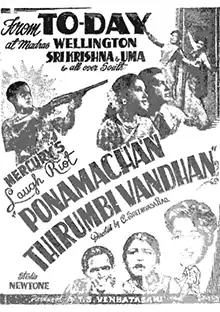Pona Machaan Thirumbi Vandhan
Pona Machan Thirumbi Vandhan (transl. The disappeared husband has returned) is 1954 Indian Tamil-language drama film directed by C. Srinivasa Rao and produced by T. S. Venkataswami.[1][2] The film dialogue was written by V. Seetharaman and Screenplay by Mercury film Department. Music by M. S. Viswanathan and C. N. Pandurangan is an asset to the film. It stars K. A. Thangavelu, T. D. Kusalakumari and Sri Ram playing major roles with Lakshmi Kanta (actress from Uday Shankar’s 1948 film, Kalpana), T. K. Ramachandran, Friend Ramasamy and K. S. Angamuthu in supporting roles. The film was based on Punarjanmam by Thumilan.[3][4]
| Pona Machaan Thirumbi Vandhan | |
|---|---|
 Theatrical release poster | |
| Directed by | C. S. Rao |
| Produced by | T. S. Venkataswami |
| Written by | V. Seetharaman |
| Screenplay by | Mercury Films Department |
| Story by | Thumilan |
| Based on | Punarjanmam by Thumilan |
| Starring | T. D. Kusalakumari K. A. Thangavelu Sriram Lakshmikantha Friend Ramasamy T. K. Ramachandran |
| Music by | M. S. Viswanathan C. N. Pandurangan |
| Cinematography | Jiten Bannerjee V. Kumara Devan |
| Edited by | P. M. Ramamoorthy |
Production company | Newtone Studios |
| Distributed by | Mercury Films |
Release date | 26 November 1954 |
| Country | India |
| Language | Tamil |
Plot
A young man named Sambu (K. A. Thangavelu) is from a well-to-do family and his life is only to chew betel leaves and tobacco, besides eating. He also fond of reeling out platitudes about old times to his servant Kittan (C. P. Kittan). The young man is very fond of his sister Chandra (T. D. Kusalakuamari). He is keen on getting her married to a suitable young man and keeping the couple in his house. So, he release a peculiar advertisement asking for a bridegroom who has to send application money of Rs.1, 000/- to be considered for the alliance!. A young man (Sri Ram), who was mostly in North India and sick of Chappathi – Kuruma, wishes to get back home. So, he replies to the ad. Another person and his sister Vimala (Lakshmi Kantha) then come to Sambhu's house. Not interested in the "Ad for groom" business. Chandra leaves the house. She meets Sriram and both, unaware of identity fall in love. They meet with a car accident and the rich car owners takes them home for treatment, thinking they are a married couple! Afraid of scandals, they change their names, leading to more complications. How the complication are solved forms the rest of the film.[1]
Cast
|
|
Reception
Randor Guy stated in the article, In spite of the impressive cast and talented technical behind the camera, the movie did not do well. Not surprisingly, U. R. Jeevarathinam, a talented singer with a high – pitched voice sang all the songs for the heroine, but the music did not become popular.[1]
Soundtrack
Music by M. S. Viswanathan, C. N. Pandurangan and lyrics were written by V. Seetharaman and N. S. Chithambaram. Singer is U. R. Jeevarathinam. Playback singers are Jikki, U. R. Jeevarathinam, Radha Jayalakshmi, P. Leela, A. G. Rathnamala, Sathyavathi, Subbulakshmi, K. R. Chellammuthu, V. N. Sundharam and A. L. Raghavan[5]
| No | Song | Singers | Lyrics | MD | Length(m:ss) |
|---|---|---|---|---|---|
| 1 | "Aatharam Nin Paadham" | Radha Jayalakshmi | V. Seetharaman | M. S. Viswanathan | 03:37 |
| 2 | "Pennai Veeddil" | P. Leela & A. G. Rathnamala | |||
| 3 | "Koduthidu Neeye Koduthidu" | A. G. Rathnamala & K. R. Chellamuthu | 03:11 | ||
| 4 | "Yaarai Yematra Vandheer" | U. R. Jeevarathinam | 03:28 | ||
| 5 | "Idhayam Ennum" | A. M. Rajah & U. R. Jeevarathinam | C. N. Pandurangan | 02:41 | |
| 6 | "Odam Polae Namathu" | V. N. Sundharam, A. L. Raghavan, Sathyavathi & Subbulakshmi | 02:34 | ||
| 7 | "Yeno Naanum Vaaduren" | Jikki | N. S. Chithambaram | 03:03 |
References
- Guy, Randor (14 December 2013). "Blast from the Past – Pona Machaan Thirumbi Vandhan 1954". The Hindu. Archived from the original on 11 January 2014. Retrieved 1 February 2017.
- "Pona Machan Thirumbi Vandhan". In.com India. Retrieved 11 July 2016.
- "Pona Machan Thirumbi Vandhan". gomolo. Retrieved 11 July 2016.
- "Pona Machan Thirumbi Vandhan 1954 Tamil Movie". filmiclub. Retrieved 11 July 2016.
- G. Neelamegam. Thiraikalanjiyam – Part 1 (in Tamil). Manivasagar Publishers, Chennai 108 (Ph:044 25361039). First edition December 2014. pp. 77–78.